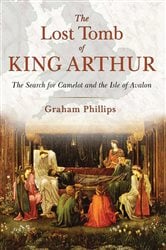
The Lost Tomb of King Arthur | Free Book

The Search for Camelot and the Isle of Avalon
One man’s journey to uncover the final resting place of the historical
King Arthur
• Pinpoints the exact locations of Arthur’s tomb, the ruins of Camelot, and the sword Excalibur using literary research and the latest geophysics equipment
• Examines previously unknown ancient manuscripts preserved in the vaults of the British Library--including one written within the living memory of Arthur’s time
• Reveals the mythic king as the real-life leader Owain Ddantgwyn, who united the British to repel invasion from Germany around 500 AD
One of the most enigmatic figures in world history, King Arthur has been the subject of many fantastical tales over the past 1500 years, leading many scholars to regard him and his fabled city of Camelot simply as myth. But, as Graham Phillips shows through a wealth of literary and scientific evidence, King Arthur was a real man, Camelot a real place, and the legendary Excalibur a real sword--and Phillips has located them all.
Phillips examines the earliest stories of Arthur as well as previously unknown ancient manuscripts preserved in the vaults of the British Library in London, such as the work of the 9th-century monk Nennius, to pinpoint the exact locations of Arthur’s tomb, the ruins of Camelot, and the sword Excalibur. He reveals the mythic king as the real-life leader Owain Ddantgwyn, who united the British to repel invasion from Germany around 500 AD. Moving his quest from library vaults to the real sites of Arthur’s life, the author confirms his research through a Dark Age monument, hidden away in the mountains of western Britain, that bears an inscription about a powerful warlord who went by the battle title “Arthur.” He visits archaeological excavations at the ruins of Viroconium, near Wroxeter in Shropshire, clearly identifying the ancient city as Camelot, the fortified capital of Arthur’s Britain. Working with specialist divers and marine archaeologists, he surveys the depths of an ancient lake in the English countryside to reveal the resting place of Excalibur. Enlisting a team of scientists and sophisticated geophysics equipment, he uncovers the lost grave of the historical King Arthur, buried with his shield, just as told in legend.
The culmination of 25 years of research, including new translations of primary source material, this book provides the necessary evidence to allow King Arthur to finally be accepted as the authentic British king he was.
• Pinpoints the exact locations of Arthur’s tomb, the ruins of Camelot, and the sword Excalibur using literary research and the latest geophysics equipment
• Examines previously unknown ancient manuscripts preserved in the vaults of the British Library--including one written within the living memory of Arthur’s time
• Reveals the mythic king as the real-life leader Owain Ddantgwyn, who united the British to repel invasion from Germany around 500 AD
One of the most enigmatic figures in world history, King Arthur has been the subject of many fantastical tales over the past 1500 years, leading many scholars to regard him and his fabled city of Camelot simply as myth. But, as Graham Phillips shows through a wealth of literary and scientific evidence, King Arthur was a real man, Camelot a real place, and the legendary Excalibur a real sword--and Phillips has located them all.
Phillips examines the earliest stories of Arthur as well as previously unknown ancient manuscripts preserved in the vaults of the British Library in London, such as the work of the 9th-century monk Nennius, to pinpoint the exact locations of Arthur’s tomb, the ruins of Camelot, and the sword Excalibur. He reveals the mythic king as the real-life leader Owain Ddantgwyn, who united the British to repel invasion from Germany around 500 AD. Moving his quest from library vaults to the real sites of Arthur’s life, the author confirms his research through a Dark Age monument, hidden away in the mountains of western Britain, that bears an inscription about a powerful warlord who went by the battle title “Arthur.” He visits archaeological excavations at the ruins of Viroconium, near Wroxeter in Shropshire, clearly identifying the ancient city as Camelot, the fortified capital of Arthur’s Britain. Working with specialist divers and marine archaeologists, he surveys the depths of an ancient lake in the English countryside to reveal the resting place of Excalibur. Enlisting a team of scientists and sophisticated geophysics equipment, he uncovers the lost grave of the historical King Arthur, buried with his shield, just as told in legend.
The culmination of 25 years of research, including new translations of primary source material, this book provides the necessary evidence to allow King Arthur to finally be accepted as the authentic British king he was.
In The Press
“Graham Phillips’s erudite, convincing, and definitive deductions have led to very real discoveries apparent for all to see. In The Lost Tomb of King Arthur Graham reveals the true history and final resting place of Britain’s most famous legendary king.”
Also read:
- Title: The Lost Tomb of King Arthur | Free Book
- Author: Steven
- Created at : 2024-12-07 03:24:15
- Updated at : 2024-12-12 22:43:28
- Link: https://novels-ebooks.techidaily.com/95782530-9781591437581-the-lost-tomb-of-king-arthur/
- License: This work is licensed under CC BY-NC-SA 4.0.
